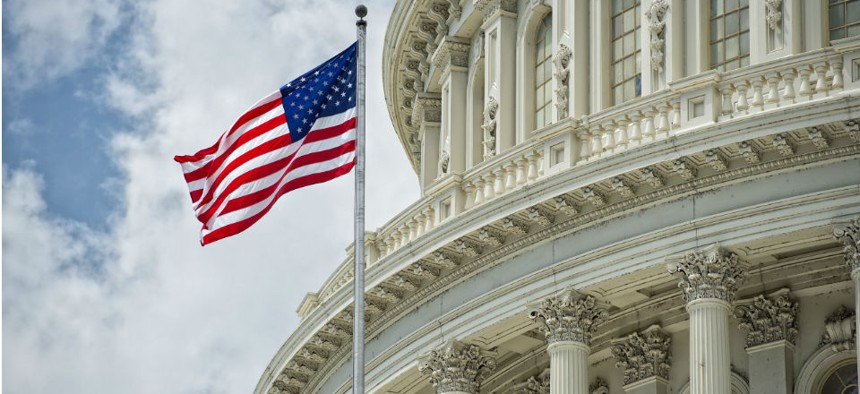
Americans are losing faith in Congress, the president and both major political parties. Andrea Izzotti/Shutterstock.com
The Scariest Thing About Ebola: Americans' Lack of Trust in Institutions
Trust deficit runs deeper than one president—or even the presidency.
Doctors at a Texas hospital unwittingly release an Ebola-infected man. The hospital blames a flaw in the electronic health records system and then backtracks: The doctors blew it.
The home shared by the Liberian man and four people is a nest of infectious materials, where cleanup was delayed by more than a week due to a bureaucratic snafu. State health department officials apologize.
In Liberia, the U.S. assistance President Obama promised several weeks ago has been slow to arrive, according to The New York Times, "and logistical glitches have prevented the United States military from being able to quickly set up the hospitals and treatment centers needed to halt the virus." The general in command says it will take "several weeks" before the U.S. military is fully responsive to the months-old crisis.
Once again, Americans are reminded of the limits of U.S. social institutions—in this case various state, local, and federal government agencies and private-sector health systems that responded to the Ebola crisis slowly, inefficiently, and with a lack of candor that Americans, unfortunately, have come to expect.
Steadily, over the past four decades, the nation has lost faith in virtually every American institution: banks, schools, colleges, charities, unions, police departments, organized religion, big businesses, small businesses and, of course, politics and government. A Pew Research Center survey in October 2013 found trust in government at a near-record low. While specific federal agencies received generally high marks (including the Centers for Disease Control and Prevention), Americans continued to lose faith in the presidency, Congress, and the two major parties.
In short, the United States faces crises of leadership and trust. Which, to me, is the scariest thing about the Ebola outbreak. I'm far less worried about the disease striking me or my loved ones than I am about what this incident says about the nation's ability to survive a true cataclysm. Whether the next existential event is Ebola or ISIS or any of the countless 21st-century horrors, we are only as strong as our institutions—and our trust in them.
Eighteen days ago, the president said, "I want the American people to know that our experts, here at the CDC and across our government, agree that the chances of an Ebola outbreak here in the United States are extremely low." Once the disease crossed into the United States, a phalanx of administration officials sought to reassure the public.
"The system that's in place, with our health care infrastructure, would make it extraordinarily unlikely that we would have an outbreak," said Dr. Anthony Fauci, the director of the National Institute of Allergy and Infectious Diseases.
Do you believe Fauci? Do you trust Obama? Stipulate, for a moment, that they are right—that Ebola is a far less dangerous disease in a nation like the United States that takes sanitation and health care so seriously. It's important that we be able to trust these and other officials enough to 1) heed their advice to limit the spread of the disease, and 2) not overreact, which leads to panic in the short term and deepens mistrust in the long term.
When the final outcome of events like these don't match the initial fear and hype (remember the so-called bird flu?), Americans grow a bit more numb, and more likely to let down their guard. It's the boy-crying-wolf syndrome that the Obama administration hopes to avoid.
Back to the stipulation: Is the Obama team right about Ebola? The fact is, nobody knows whether the disease will spread or mutate. Crises are, almost by definition, unpredictable—which is why we have institutions and leaders whom we must trust to adapt to what comes.
Trust. There's that word again. How much faith can the public summon toward an administration that used incompetence as a defense in scandals involving the IRS, Benghazi, and Obamacare; that lied about its surveillance of Americans; and that just recently acknowledged dangerous misjudgments regarding the Secret Service and ISIS?
And yet, it wasn't Obama who misled the public about Saddam Hussein or the Vietnam War or Watergate. The trust deficit runs deeper than one president—or even the presidency. While vast economic, social and technological changes buffet the lives of most Americans, those institutions that are supposed to shield people are failing to adapt.
Most of these public- and private-sector entities were created in the 19th century; they were expanded and contorted in the 20th century; and they're maddeningly ill-equipped for the 21st century. This indictment includes the media, an institution democratized by technology and thus desperate—prone to exploit any crisis in search of conflict, clicks, and cash. Thanks again to new technology, Americans today are both better informed and subjected to more hype.
Why does any of this matter? During the 2012 presidential campaign, I wrote a story called "In Nothing We Trust" that sought to capture the cause and effect of institutional decline. From Muncie, Ind., I wrote:
When people trust their institutions, they're better able to solve common problems. Research shows that school principals are much more likely to turn around struggling schools in places where people have a history of working together and getting involved in their children's education. Communities bonded by friendships formed at church are more likely to vote, volunteer, and perform everyday good deeds like helping someone find a job. And governments find it easier to persuade the public to make sacrifices for the common good when people trust that their political leaders have the community's best interests at heart. "Institutions—even dysfunctional ones—are why we don't run amok in the woods," [sociologist Laura] Hansen says.
Still, no metrics exist to measure life without institutions, because they've been around as long as humankind. The first institution was the first family. The tribe was the first community. The first tribe's leader was the first politician, and its elders were the first legislature. Its guards, the first police force. Its storyteller, a teacher. Humans are coded to create communities, and communities beget institutions.
What if, in the future, they don't? People could disconnect, refocus inward, and turn away from their social contract. Already, many are losing trust. If society can't promise benefits for joining it, its members may no longer feel bound to follow its rules.
Ebola is a serious threat, but it's not the disease that scares me. What scares me is that fact that we can't trust the institutions that are supposed to deal with such threats, and we can't trust the men or women who lead them. Which means they can't help us.
(Image via Andrea Izzotti / Shutterstock.com)
NEXT STORY: Democrats Hoping for Clinton Magic In Arkansas







